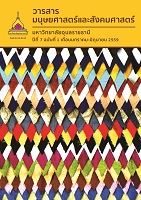การประเมินผลการจัดทาโครงการ “บอกกล่าวเล่าต่อ” ในการจัดการเรียนการสอน รายวิชาวัฒนธรรมร่วมสมัย
Main Article Content
บทคัดย่อ
งานวิจัยเรื่อง “การประเมินผลการจัดทาโครงการ ‘บอกกล่าวเล่าต่อ’ ในการจัดการเรียนการสอนรายวิชาวัฒนธรรมร่วมสมัย” (The Evaluation of “Say it Forward” Project of Contemporary Culture Course) มีวัตถุประสงค์เพื่อประเมินผลการทากิจกรรมโครงการ “บอกกล่าวเล่าต่อ” ในการเรียนการสอนภาคการศึกษาที่ 2/2556 มี เพื่อนาผลจากการประเมินไปปรับปรุงการเรียนการสอนในรายวิชาวัฒนธรรมร่วมสมัย ทาการศึกษาวิจัยโดยการเก็บแบบสอบถามประมวลค่าร้อยละ และการสนทนากลุ่มย่อย โดยใช้โมเดล CIPP มาใช้ประเมินผลโครงการ ซึ่งมีนักศึกษาทั้งหมด 109 คน แบ่งเป็น 11 กลุ่ม
ผลการศึกษาพบว่า ในด้านการประเมินสภาวะแวดล้อมก่อนการดาเนินการโครงการ การจัดทาโครงการดังกล่าวมีความเหมาะสมโดยสามารถตอบโจทย์มาตรฐานผลสัมฤทธิ์ทางการเรียนรู้ของรายวิชา และมีความเป็นไปได้ในการดาเนินโครงการอย่างต่อเนื่อง นักศึกษาสามารถเข้าถึงเทคโนโลยีที่จาเป็นต่อการจัดทาโครงการ มีความสามารถในด้านการเรียนรู้ และมีความคิดเชิงสร้างสรรค์ ในส่วนของการประเมินปัจจัยนาเข้า พบว่า ระยะเวลา เกณฑ์การให้คะแนน รวมถึงความเป็นได้ในการแลกเปลี่ยนความคิดเห็นของนักศึกษาอยู่ในเกณฑ์ที่เหมาะสม สาหรับการประเมินกระบวนการจัดการเรียนการสอน พบว่านักศึกษาส่วนใหญ่มีส่วนร่วมในการดาเนินโครงการ และการแลกเปลี่ยนเนื้อหาต่างๆ ผ่านแฟนเพจอย่างสม่าเสมอ โดยมีกลุ่มที่ทางานไม่สม่าเสมอจานวน 2 กลุ่ม และกลุ่มที่มีวินัยในการทางานสูง จานวน 2 กลุ่ม เมื่อประเมินผลผลิตที่เกิดขึ้น พบว่า นักศึกษาสามารถทางานได้ตามเป้าหมายของกิจกรรม และตามที่ผู้สอนมุ่งหวัง ทั้งนี้ นักศึกษาบางส่วนมีการสานต่อโครงการภายนอกห้องเรียนแม้ว่าจะมีการดาเนินงานไม่สม่าเสมอก็ตาม
Evaluation of the Say it Forward Project of the Contemporary Culture Course
This research aimed to evaluate the project Say it Forward carried out in the Contemporary Culture course in the second semester of the 2013 academic year and to use the results to improve the course’s teaching and learning process. There were 109 students enrolled in this class and they were divided into 11 groups. Data collected from questionnaires were analyzed using the statistical model of percentages while those from focus groups were processed by the CIPP model. The study found that, in terms of context evaluation, the project was suitable to be used as an in-class activity, meeting the course outcomes under the Thai Qualifications Framework. In addition, there was a possibility that the project could be continued because the students had access to course-required technology (a Facebook fanpage), the ability to learn, and a creative mind. In terms of input evaluation, the research found that the project length, the marking criteria, and the feasibility of intellectual exchange among the students were at an appropriate level. With regard to process evaluation, the research found that most students participated in the project, regularly exchanging their ideas about the course contents on the fanpage. Two groups of students did not submit their work on time while another two were highly disciplined. In terms of product evaluation, the research found that the students achieved the activity goals, meeting the instructor’s expectation. Some students carried out the project outside the classroom even though they were unable to do it on a regular basis.
Article Details
บทความที่ได้รับการตีพิมพ์เป็นลิขสิทธิ์ของวารสารมนุษยศาสตร์และสังคมศาสตร์ มหาวิทยาลัยอุบลราชธานี
ข้อความที่ปรากฏในบทความแต่ละเรื่องในวารสารวิชาการเล่มนี้เป็นความคิดเห็นส่วนตัวของผู้เขียนแต่ละท่านไม่เกี่ยวข้องกับมหาวิทยาลัยอุบลราชธานี และคณาจารย์ท่านอื่นๆในมหาวิทยาลัยฯ แต่อย่างใด ความรับผิดชอบองค์ประกอบทั้งหมดของบทความแต่ละเรื่องเป็นของผู้เขียนแต่ละท่าน หากมีความผิดพลาดใดๆ ผู้เขียนแต่ละท่านจะรับผิดชอบบทความของตนเองแต่ผู้เดียว


